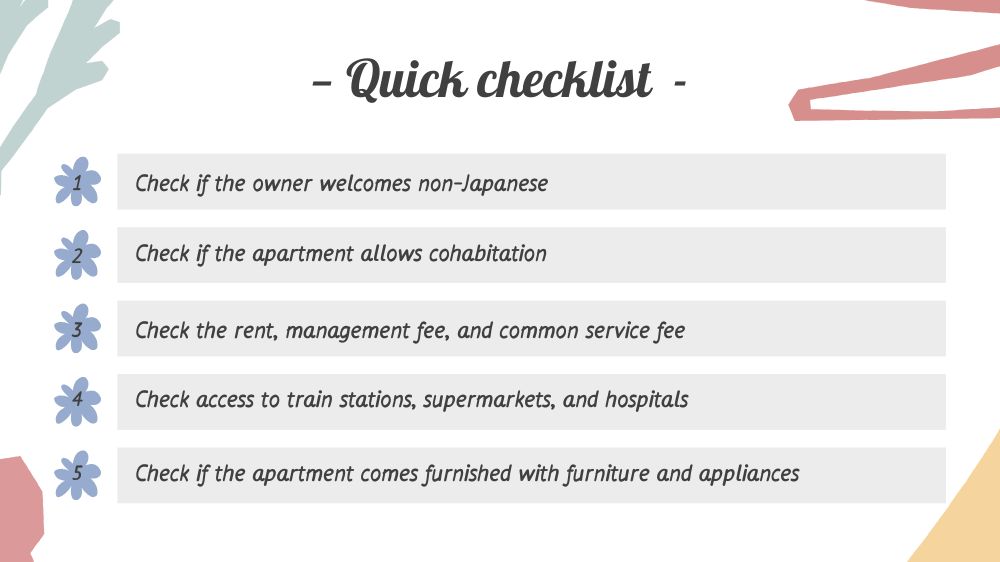Jackson and I moved into our current apartment—our first sweet home—in 2022. We visited a real estate agency and went for a private viewing together. At that time, we weren’t married yet and were simply looking for an apartment where we could live together as a couple. In this article, I’d like to share our experiences and what we’ve learned. If you just want to know how much we paid initially, jump ahead to this section!
Contents
What to check when choosing an apartment
Before visiting a real estate agency, you can browse rentals on the websites below. These are the same websites Japanese people use to find housing. Unfortunately, they’re not available in English, so you may need to use Google Chrome’s translation function, etc. You can view prices, photos, and other details on these sites, which will help you explain your preferences to a real estate agent!
- Suumo (https://suumo.jp/tokushu/foreigner/english/)
- LIFULL HOMES’S (https://www.homes.co.jp)
- At home (https://www.athome.co.jp)
- CHINTAI (https://www.chintai.net)
Here is a list of real estate companies that offer services in English in the Tokyo area (https://suumo.jp/tokushu/foreigner/english_company/tokyo.html). If you visit agencies that don’t offer English services, I strongly recommend bringing a Japanese friend, even if you can speak some Japanese. There are many technical terms that were difficult even for me as a native Japanese speaker.
Quick checklist for choosing an apartment Here’s a handy checklist to use when looking at rental properties!

1. Check if the owner welcomes non-Japanese
I was hesitant to bring up this topic, as it’s quite embarrassing to talk about as a Japanese person. In Japan, it’s illegal to limit access to housing based solely on nationality, but unfortunately, the reality is that some property owners still refuse to rent to non-Japanese residents.
The reasons often given include language barriers, difficulties securing a Japanese guarantor, concerns about unpaid rent, or the possibility of the tenant leaving the country suddenly. When we asked a real estate agent about this issue, she told us that as of 2022, about half of the property owners in Tokyo still hesitate to rent to foreigners. That was shocking — both to me and to Jackson — and we were very upset by the situation.
I realize this might seem like unnecessary information to include, but I wanted to speak honestly. It’s important to be aware of this reality so you can avoid dealing with ignorant owners who may hold discriminatory views. In Japan, many apartments are targeted toward specific groups — such as singles, couples, or families — and some openly welcome non-Japanese residents. If you choose from apartments that are foreigner-friendly, you can avoid these frustrating situations altogether.
Although I was the primary contract holder for our apartment, Jackson also had to go through a screening process as my roommate (more details are here). The real estate agent explained to the landlord that Jackson was friendly, fluent in Japanese, and a responsible person working at a school, actively involved in the community, and even part of the local fire department (His experiences as a JET teacher was very unique).
Fortunately, our landlord was not one of those who reject applicants simply because they aren’t Japanese.
2. Check if the apartment allows cohabitation
You need to make sure that the apartment allows couples to live there. If couples are allowed, the rental listing will usually say “二人入居可” (double occupancy allowed) in the conditions. Even if it’s not explicitly mentioned, you can always ask the real estate agent or try to negotiate with the owner. However, owners often designate apartments for specific types of tenants — such as singles or families — to avoid potential issues like noise or lifestyle differences. Also, tenant screening tends to be stricter when applying as a couple or for cohabitation. I’ll explain more about this later based on my own experiences.
3. Check the rent, management fee, and common service fee
When looking for an apartment to rent in Japan, you must be prepared to pay significant initial costs. This is the money you pay upfront when signing the contract, and it’s usually required in cash — credit cards are generally not accepted.
Generally speaking, the total initial expenses are said to be equivalent to 4 to 6 months’ rent. Yes, it’s quite a lot! I’ll share how much it actually cost us when we rented our apartment in a later section.
Here is a breakdown of the typical upfront expenses you should be ready for:
- Shikikin (敷金)- Security DepositThis is usually equivalent to one to two months’ rent. It is entrusted to the landlord at the time of moving in and is used to cover cleaning and repair costs when you move out. Any unused portion may be refunded, depending on the condition of the apartment.
- Reikin (礼金)- Key moneyKey money is a non-refundable payment given to the landlord as a gesture of appreciation. It typically amounts to one to two months’ rent.
- Advance rent
You must pay rent in advance starting from the date your contract begins. For example, if you sign a contract on June 15 but plan to move in on July 1, you’ll usually be charged a prorated amount for the second half of June, plus the full rent for July.
- Agency fee
This is the commission paid to the real estate agency for their services. It’s usually up to one month’s rent (plus consumption tax). This amount is regulated by law and cannot exceed the legal limit.
- Fire Insurance
Fire insurance is required as part of the rental agreement. It typically covers damage from fires, water leaks, lightning, and similar disasters, depending on the policy.
- Guarantor fee
This is the fee paid to a guarantor company. In some cases, landlords may accept a personal guarantor—such as a parent with a stable job—but it’s increasingly common to be required to use a guarantor company designated by the landlord.
- Key exchange fee
This fee covers the cost of replacing the apartment’s locks for security purposes, especially if the previous tenant used the same keys.
If you want to reduce the initial costs, you can look for apartments that don’t require a security deposit (敷金) or key money (礼金). However, it’s important to understand why some landlords offer these conditions. In many cases, these apartments may be less popular — for example, they might have poor sunlight, outdated facilities, or be located in inconvenient areas — and the owners are eager to find tenants quickly.
Also, keep in mind that no security deposit doesn’t mean no cleaning or repair costs. Even if you don’t pay a deposit upfront, you will likely be charged for cleaning and repairs when you move out, and those fees will be charged separately.
4. Check access to train stations, supermarkets, and hospitals
Transportation access is very important—especially in a city like Tokyo, where rent in central areas can be extremely expensive. Generally speaking, the farther you are from the city center, the lower the rent tends to be. Stations where express or rapid trains stop are more popular and often more expensive, while stations served only by local trains usually have more affordable housing options.
Not all companies provide housing subsidies, but most cover commuting costs in Japan. So it’s a good idea to look for an apartment that offers a reasonable rent while still being convenient for commuting to work and going out. One strategy is to choose a location near the first station on a train line. Your commute may be longer, but you’ll have a better chance of getting a seat—something that’s rare during rush hours in Tokyo!
I also highly recommend living somewhere with access to at least two different train stations served by different train lines. Ideally, one station should be within a 10-minute walk for daily use, and the other could be a bit farther—around a 15-minute walk. Although Japanese trains are known for being punctual, delays and service suspensions (often due to personal injury accidents or even minor earthquakes) still happen frequently. Having multiple stations within walking distance can save you a lot of trouble when one line goes down unexpectedly.
5. Check if the apartment comes furnished with furniture and appliances
One important point I’d like to share is about furniture. In Japan, it’s not common to find furnished apartments. In most cases, you’ll need to buy and prepare all the furniture and appliances yourself—with the exception of an air conditioner, which is usually included.
This can make cohabitation more challenging, especially for couples, since it requires a significant upfront investment—not just for the rental deposit, but also for all the household items.
I was honestly surprised by this when I was studying in the UK. Most apartments were fully furnished, which made both moving in and moving out much easier and more affordable.
How much we paid before moving in
The rent for our apartment is ¥120,000 per month in total—¥115,000 for the rent itself, and ¥5,000 for common service charges. We were required to pay a security deposit equivalent to two months’ rent, but no key money was needed.

In the end, we paid about ¥560,000 (approximately $3,733 USD, calculated at an exchange rate of 1 USD = 150JPY) as our initial move-in cost.
| Item | Cost |
|---|---|
| Shikikin (敷金)- Security Deposit | ¥0 (0 USD) |
| Reikin (礼金)- Key money | ¥230,000 (1,533 USD) |
| Advance rent for 1 month | ¥115,000 (767 USD) |
| Common service charge for 1 month | ¥5,000 (33 USD) |
| Guarantor fee | ¥60,000 (400 USD) |
| Fire insurance | ¥15,000 (100 (USD) |
| Agent cost and tax | ¥126,500 (843 USD) |
| Key exchange fee | ¥8,800 (59 USD) |
| Total | ¥560,300 (3,735 USD) |
Generally, both a security deposit and key money are required, usually equivalent to one month’s rent each. I felt that the owner of our apartment was very kind because he did not request key money, which could have been direct profit for him. Instead, the fee was fully allocated as a security deposit, which is used for cleaning and repairs when moving out.
This was a very considerate decision by the owner, as it meant we could expect to pay less when moving out of the apartment. If the cleaning or repair costs exceed the security deposit, we would be charged the difference. Conversely, if there is any money left after deducting these costs, it will be refunded to us.
After living in the apartment for three years, we can say that our initial impression was correct! Our owner consistently invests in the monthly cleaning of common areas and cares for the plants around the building. We really lucked out!
Also, please note that apartment contracts in Japan are usually for two years. When renewing the contract, or if you terminate it before the contract period ends, you will typically need to pay an additional one month’s rent on top of that month’s rent.
Three Key Reasons Why Our Apartment Search Was Successful
I believe one of the main reasons our apartment search went smoothly was that we built trust with the real estate staff quickly. We were completely transparent about our situations and didn’t hide anything. We shared information such as:
- Jackson’s job contract was ending soon, and he was planning a move to Tokyo to begin job hunting.
- I had brought Jackson to meet my parents in my hometown—a significant step, especially in Japan before marriage. It shows how seriously the couple takes their relationship.
- Due to COVID travel restrictions, Jackson’s family got to know me via video chats.
Once the real estate staff understood our circumstances, they were better equipped to explain our situation to the apartment owner and prepare documents for the screening company. Here are three takeaways from our experience:

1. Renting Under a Japanese National’s Name (For Japanese–Non‑Japanese Couples)
Considering that the apartment owner might worry about whether rent would be paid if we broke up, and because Jackson’s job contract had a limited duration, we decided to make the lease contract under my name. This meant the resident screening evaluated only me, focusing on whether my income could cover the rent. In Japan, the general standard for passing the screening is that rent should be within one‑third of monthly income.
2. Do Apartment Hunting While You Have a Job
Though I was the leaser of the apartment, Jackson was evaluated as a roommate. If the partner is also Japanese, the required documents are usually just identification and a certificate of residence—unless the apartment contract is under both names. However, if the roommate isn’t Japanese, additional documents may be required. So, I highly recommend starting apartment hunting while you have a job.
What we submitted was below:
- Identification, such as a driver’s license
- Health insurance card
- Residence card
- Certificate of residence
- Income information (in some cases, a withholding tax certificate is required; in our case, it was self-declared)
- Emergency contact information (a friend was acceptable)
As of June 2022, when we were apartment hunting, Jackson’s job contract was only valid until the end of July 2022. However, it was unnecessary for the real estate staff to share this detail with the screening company, because Jackson had sufficient income at the time to help pay rent, and the lease was under my name.
When we signed the contract, Jackson was still living in Chiba—more than two hours away from the apartment we were applying for. We explained to the screening company that we were looking for an apartment to spend weekends together. It wasn’t a lie: the lease started in June 2022, and although Jackson was still working at schools in Chiba at that time, he planned to move out of his house there soon and move into the apartment full-time.
3. Clearly State That We Are Engaged, Not Just a Couple
Since the apartment owner might have concerns about the reliability of rent payments, the real estate staff informed them that we were engaged. Being engaged conveys a more stable relationship than merely being a couple, which could imply a potential breakup in the future. In reality, we weren’t engaged at that time, but stating so felt a bit awkward yet exciting.
Cohabitation Before Marriage in Japan

Cohabitation in Japan is less common than in some other countries, not only due to cultural norms but also because of the initial costs for apartments and furniture, as well as the complicated procedures involved.
We hope this information and our personal experience can assist you both in finding an apartment and starting an exciting life together!

